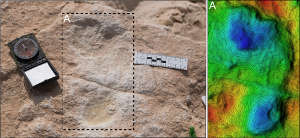Using AI to control energy for indoor agriculture
30 September 2024
Published online 23 September 2020
Evidence from fossilised human and animal footprints suggests a seasonal lake existed in a Saudi Arabian desert some 120,000 years ago.

Stewart et al., 2020
Enlarge image
“These findings highlight the importance of Arabia for understanding human prehistory and dispersals out of Africa,” says archaeologist, Mathew Stewart, from Max Planck Institute for Chemical Ecology in Germany.
Analysing the lake sediments, the scientists, including researchers from Saudi Arabia, the UK and Australia, found a heavily trampled lake surface with scattered tracks of humans and animals, indicating they were made during a dry season. The footprints were oriented in various directions and left over a period of a few hours or days, with movement mainly in a southerly direction. Shifts in seasonal rainfall could have influenced this movement.
The scientists identified 376 footprints, mostly of humans, elephants and camels. The human footprints closely resemble those of anatomically modern humans. Four adjacent human footprints found along the lake’s southwestern edge were probably made by three individuals traveling together.
The human footprint evidence found at the lake, analyses of algae derived from lake sediment, the presence of elephants, and the absence of stone tools and bones of butchered animals, suggest a seasonal, shallow freshwater lake surrounded by savannah. It is expected the lake was traversed by mobile hunter-gatherers during the dry season, who paused for a drink during the wet season before moving on to search for food.
doi:10.1038/nmiddleeast.2020.98
Stewart, M. et al. Human footprints provide snapshot of last interglacial ecology in the Arabian interior. Sci. Adv. 6, eaba8940 (2020).
Stay connected: